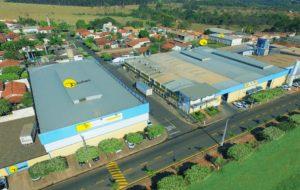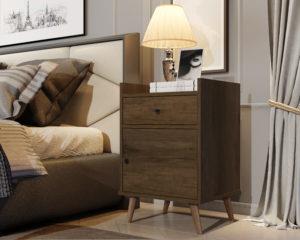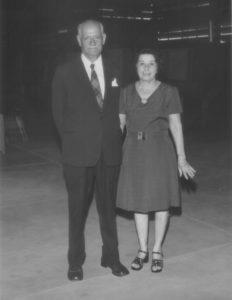(MENAFN- Brazil-Arab News Agency (ANBA))

São Paulo – In the early 20th century, the big journey of Lebanon's Bechara Nassar Frange was arriving from distant Lebanon to Brazil. Some years later, his son Jorge Nassar Frange took it upon himself the endeavor to turn the carpentry activity into a large business. Now, the new generations of the family carry forward the challenge of turning the furniture manufacturer JB Bechara – which is rooted in this family history and based in the city of Tanabi, São Paulo – into a company aligned with the modern corporate principles of inclusion, diversity and sustainability.

Rodrigo comes from the financial market
The furniture production is part of the family history from the arrival of the immigrant great-grandfather, who in his first years in Brazil made a living by doing carpentry work in Tanabi, to his son establishing a furniture plant in the city, which is now the medium-sized enterprise JB Bechara . Being a family business marked by immigration, though, was not a barrier for it to change towards advanced governance practices in a internal process started seven years ago and led by current CEO Rodrigo Nassar Bautista.
Coming from the financial market, the executive arrived in the company aiming to taking it to the next level. The process started little by little with small transformations like changing the logo and adopting new internal processes, and it was progressing towards a deeper renewal, which can now be seen in social, sustainability and diversity practices applied in the daily life.“We're rebuilding our DNA,” Rodrigo explains.
The administrative department of JB Bechara is composed by 66% of women, while production features a man manager and a woman manager, and the company makes sure to include homosexual, black and indigenous people in its staff.“Diversity is what makes us rich,” says Rodrigo. JB participates in the project Favela 3D , which aims to empower socially and financially low-income communities in Brazil, and it's responsible for conservating 840,000 meters of Atlantic Forest with its endangered species and pristine natural beauty.

The furniture is sold in brick-and-mortar and online outlets
In the production process, the principles adopted translate into practices like using 100% recycled paper made and fully reforestation wood, treating and reusing paint sludge, using green plastic and turning sawdust into ecological briquettes. And JB Bechara is preparing a big launch in the market based on environmentally sound practices. But Rodrigo prefers not to tell it yet.“In 60 days we'll have a really cool new feature for sustainability,” he says.
The company, with around 100 employees, manufactures all its furniture in a plant in 18,000-square-meter plant in Tanabi. Around 28,000 pieces are manufactured every month, including desks, sideboards, cabinets, panels, cupboards, footstools, bed headboards, dressing tables, and bedside tables. The products are made in MD and MDP. Two thousand points of sale sell the items across Brazill. E-commerce accounts for 40%.
The company is also an exporter. Although it's not the focus of the business, JB Bechara is interested in opportunities that may arise overseas. Fifteen countries buy furniture by the company; most of the shipped volume goes to Latin America. Some go to the United States, Africa, and the United Arab Emirates. Exports account for 10% of the sales.
From the immigrant to the new
JB Bechara is currently owned by the three grandchildren of the immigrant Bechara: Leila, Marcos and Isabel, children of founder Jorge. Although the business is still n family hands, it was established that, for professionalizing activities, each family nucleus would have only one representative in the administration. CEO Rodrigo, for example, represents his mother Leila in the company.“We have a corporate governance, an advisory board,” he says on the professionalization of administration. Although their last name is different, thanks to their great-grandfather name, they are collectively known as the Becharas.

Lebanon's Bechara and Joana
The great-grandfather is a source of pride for the family. Bechara used to work with sheep-farming in the Beqaa Valley and was just a 20-year-old boy when he moved to Brazil in search of a better life in 1921. His brother lived in São José do Rio Preto. Bechara landed in the Port of Santos but had no money to go to the other city.“He walked during three months from Santos to Barretos,” says Rodrigo. According to the executive, his great-grandfather fed only on bananas and water during the trip until he was picked up by his brother in Barretos.
“On May 6, 1921, he arrived in Tanabi,” says CEO and great-grandson Rodrigo. In Brazil, Bechara Nassar Frange married Lebanon's Joana Madi and had four children. Other descendants of the immigrant also own furniture business. JB Bechara was the company left by Bechara's son Jorge Nassar Frange, founder of the company, for his daughters. Their brother would later join the business.
In changing the company, Rodrigo finds himself doing what he believes in as a human being in accordance with his family upbringing. He understands that this is yet another challenge in the life of the Becharas (or Nassar Franges), much like the ones his great-grandfather and grandfather faced.“JB is not just a company in the world but a company for the world. I can't just think on profit; I have to use this giant framework to do what is right,” he says.
Translated by Guilherme Miranda
The post Lebanese family business changes towards sustainability appeared first on Agência de Notícias Brasil-Árabe .
MENAFN12042022000213011057ID1104003341
Legal Disclaimer:
MENAFN provides the information “as is” without warranty of any kind. We do not accept any responsibility or liability for the accuracy, content, images, videos, licenses, completeness, legality, or reliability of the information contained in this article. If you have any complaints or copyright issues related to this article, kindly contact the provider above.